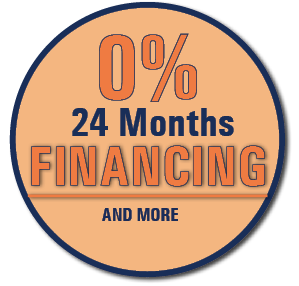In 2025, the cost of a basic AC replacement for a residential unit can range from $4,000 to $7,500
Factors that affect new air conditioner prices
The cost of AC replacement can vary depending on several factors such as the size of the AC unit, the brand, the efficiency rating, and the complexity of the installation. Additionally, regional factors and market conditions can also influence the cost.
Size
Sizing an air conditioner properly is especially important for its efficiency and also for your monthly energy bills. There is more that comes into play than just the square footage of the home. If you do need a larger air conditioner then this will increase the price compared to a smaller unit. For example, a 4 ton a/c unit costs more than a 3 ton air conditioner.
Determining the appropriate size of an air conditioner for a home requires an evaluation of several factors. HVAC professionals typically use a process called Manual J load calculation to assess the cooling needs of a residence. Here are the key considerations:
Square footage: The size of the home, specifically the square footage or floor area, is an essential factor. Larger homes typically require larger AC units to effectively cool the space.
Climate: The local climate plays a significant role in determining the cooling requirements. Hotter climates require more cooling capacity to combat higher temperatures and humidity levels.
Insulation: The quality and level of insulation in the home impact its cooling load. Well-insulated homes generally retain cool air better, reducing the required AC capacity.
Orientation and windows: The direction the home faces and the number, size, and efficiency of windows affect heat gain from sunlight. East and west-facing windows, for example, receive more direct sunlight, resulting in higher cooling loads.
Air infiltration: The level of air leakage in the home affects the cooling load. Drafty or poorly sealed homes may require additional cooling capacity to compensate for the extra heat infiltration.
Season
The time of year can have an impact on new air conditioner prices. In many regions, the demand for air conditioners tends to be higher during the warmer months, such as spring and summer, when people are looking to replace or upgrade their cooling systems.
During peak demand periods, air conditioner prices may be higher due to increased market activity and competition for installation services. HVAC companies may adjust their pricing to reflect the higher demand and limited availability of resources.
On the other hand, during the off-peak seasons, such as fall and winter, when the demand for air conditioners is lower, you may find better deals and discounts on new AC units. HVAC companies may offer promotions and incentives to encourage sales during slower periods.
It’s worth noting that pricing can also be influenced by other factors like market conditions, regional climate, and the availability of specific models.
Brand
Yes, different brands of air conditioners can vary in cost. Some well-known and reputable brands tend to command a higher price due to their brand reputation and quality. These brands often invest heavily in research and development, use advanced technologies and are more well-known, which can contribute to higher prices.
On the other hand, there are also more budget-friendly options available from lesser-known brands or entry-level models from established brands. Often these units are very similar to their brand name counterparts and sometimes are even manufactured in the same facility. These units may have lower upfront costs but might not have the same level of durability, additional features or warranty support as the higher-priced options. If there is a specific feature or warranty you are interested in, be sure to ask your HVAC expert if that brand carries what you are looking for.
When considering the cost of an air conditioner, it’s important to assess factors beyond the initial price, such as energy efficiency, long-term reliability, warranty coverage, and the availability of service and parts. This will help you make a more informed decision about which brand and model are the best fit for your needs and budget. Just remember, in most cases the company installing the unit is much more important than the unit itself in terms of longevity and operating efficiency for your needs.
Efficiency
Generally, more efficient air conditioning units tend to have higher upfront costs compared to less efficient models. Here’s how efficiency can impact the price:
Energy savings: Higher efficiency air conditioners consume less energy to provide the same cooling output. Over time, this translates into reduced energy bills, which can help offset the initial investment. However, the upfront cost of a more efficient unit may be higher due to the advanced technology and components used to achieve better energy performance.
Advanced features and technologies: High-efficiency air conditioners often incorporate advanced features and technologies that contribute to their efficiency. These can include variable-speed compressors, two-stage cooling, improved airflow design, and smart thermostats. These additional features and technologies can increase the manufacturing and development costs, leading to a higher price tag.
Longer lifespan and warranties: Efficient air conditioning units tend to be built with higher quality materials and components, which can contribute to their longevity. They may also come with longer warranty periods, providing added peace of mind to consumers. The extended lifespan and warranty coverage can justify the higher price of more efficient models.
Rebates and incentives: Depending on your location, there may be utility rebates, tax credits, or other incentives available for installing high-efficiency air conditioners. These incentives can help offset the initial cost, making efficient models more financially viable.
It’s important to consider both the upfront cost and the long-term energy savings when evaluating the price of an air conditioning unit. Higher efficiency units may have a higher initial investment, but they can provide significant energy savings over their lifespan. It’s advisable to consult with HVAC professionals and assess the payback period to determine the most cost-effective option for your specific needs and budget.
Ductwork
It is possible that you may need new ductwork to be installed for a new air conditioner. This can substantially increase the price of a new air conditioner.
There are several situations where new ductwork may be necessary:
Inadequate or damaged ductwork: If your existing ductwork is in poor condition, such as having leaks, improper insulation, or significant damage, it may need to be replaced or repaired to ensure proper airflow and efficiency for the new air conditioner.
Incorrect sizing: If your current ductwork is not sized properly for the new air conditioner, it may not be able to deliver the required airflow and cooling capacity. In such cases, resizing or modifying the ductwork may be necessary to ensure optimal performance.
Duct design and layout: The layout and design of the existing ductwork may not be suitable for the new air conditioner. For example, if the previous system was smaller or had a different configuration, it might require modifications or additional ductwork to accommodate the new unit properly.
Home renovations or additions: If you have made changes to your home’s layout, such as adding rooms or expanding living spaces, it may be necessary to install new ductwork to ensure proper airflow and cooling throughout the entire area.
Does it Save Money to Replace AC and furnace at the same time?
The short answer is, yes it will usually save some cost to replace both units at the same time. At a minimum you will save on labor as it is easier to do both at the same time rather than one at a time. This also saves the company from ordering and transporting equipment on two separate occasions rather than one.
This can also help ensure your systems are compatible. In some instances, your old furnace may not match with your new air conditioner. Then it becomes necessary to replace both.
Some companies, including us here at Quality Comfort, offer extra benefits when you replace your full system all at once.
Read more about full HVAC system replacement.
Tax Credits for Air Conditioner Installation
Often times tax credits are available for new air conditioner installations. This can help offset the cost of replacement. In 2025 there are tax credits up to $600 for air conditioners and up to $2,000 for heat pumps. Learn more about all available home tax credits at energystar.gov.
Financing for New Air Conditioners
Quality Comfort offers financing plans for air conditioner replacement. We offer many options to make affordable monthly payments and many plans with 0% interest. You can get the comfort you deserve for a budget that fits your family.


